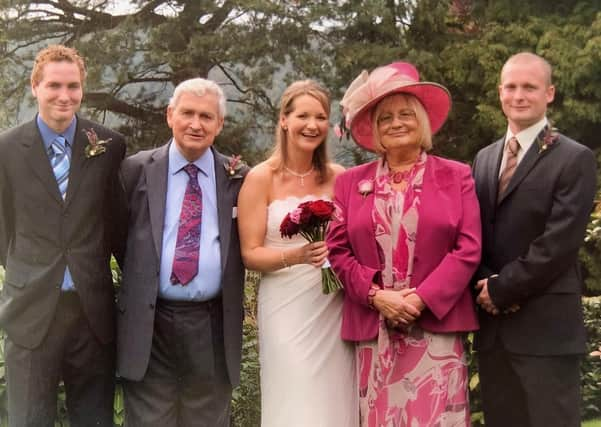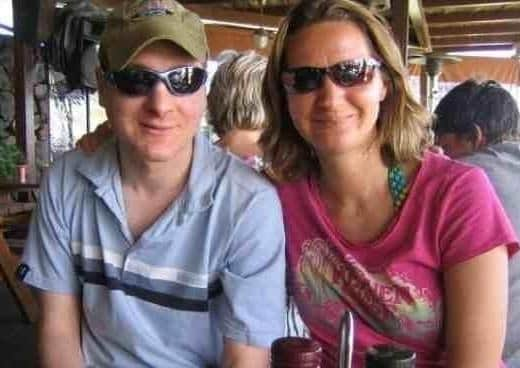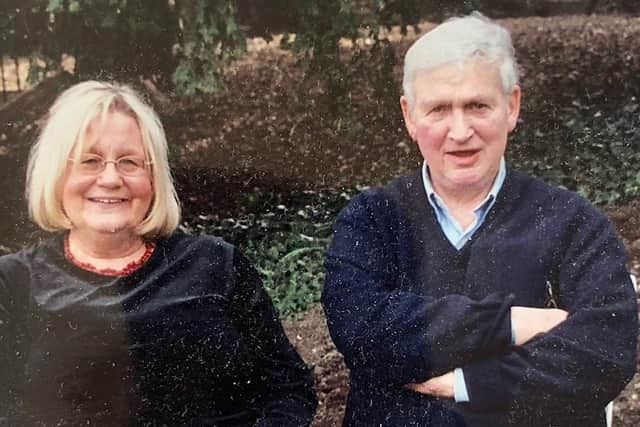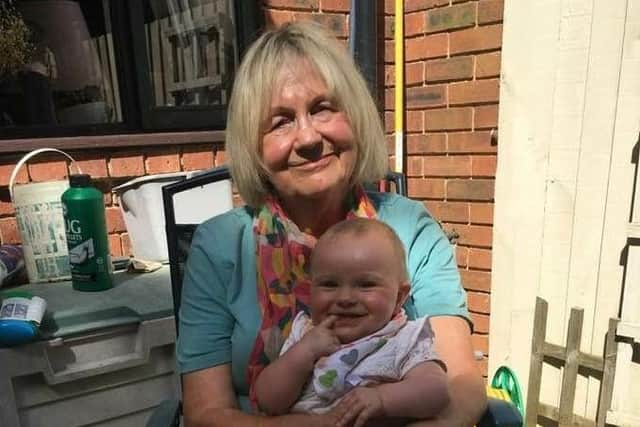What my family’s losses have taught me about nation’s Covid grief: Polly Rippon


The grim news that over 113,000 people have died from Covid in the UK has brought my own grief to the fore.
I’m no stranger to grief having lost my mum, my dad and my youngest brother all by the age of 44. In recent weeks I’ve struggled to watch the news – so much death and sadness brings back all the emotions I felt when I lost my loved ones.
Advertisement
Hide AdAdvertisement
Hide AdThe shock, the numbness, the anger and the lingering sorrow follows me around every single day. I was ‘lucky’ enough to mourn my family in the usual way. To attend their funerals, which were sad but celebratory events, and in my parents’ cases be with them and hold their hands as they took their final breaths and slipped away.


It gave me great comfort to know I was with them when they died, so, I cannot imagine how it must feel not being there with my loved one as they pass away.
Having a last conversation and watching them die on an iPad while they are lying miles away in a hospital bed must be horrific.
I can’t imagine only being able to have a small funeral to celebrate their life and being unable to accept the physical comfort of a much-needed hug seems unbearable to me.
Advertisement
Hide AdAdvertisement
Hide AdIn the dark months that follow a funeral, when those who have never experienced a big loss ask if we are ‘over it yet?’, I cannot imagine not being able to see my friends and loved ones to share happy memories, shed tears and enjoy a few drinks in the pub to block out the excruciating pain.


These are the normal rituals we go through when someone we love dies and they help us to process our grief, but the normal rites of passage have been stolen by the pandemic.
Having grief counselling and talking and crying about my losses helped with the shock – but I’m not sure it would have had the same effect online.
The scar these tragic deaths are going to leave behind on the friends and families of the 100,000+ is immeasurable. Grief rips through families causing devastation and destruction, changing lives forever.
Advertisement
Hide AdAdvertisement
Hide AdThe families of those who have lost their lives to Covid will be no different. The real tragedy is that it didn’t have to be this way.


This huge episode of collective grief is, in my opinion, the result of incompetence and weak leadership in government – we looked to the state to protect us in our time of need and it failed dismally.
No, Boris Johnson, you did not do everything you could. Captain Sir Tom Moore – the man you described as ‘a hero in the truest sense of the word’ – died from a virus you failed to control. He raised £33m for the NHS in the last year of his life to plug a huge hole left by Tory austerity. If your government had handled this crisis effectively and got a hold on it last year, he might still be here. At 100 he might not have had many years left but he’d certainly have got to spend a bit longer with his family.
At the start of the Covid-19 pandemic the strategy seemed to be to ‘take it on the chin’, and sacrifice lives. You forgot these people were our loved ones and your plan backfired spectacularly. The UK Government has been behind the curve at every turn, on PPE, on care homes, on Test and Trace, on protecting frontline staff, on schools, on provision of food and computers for vulnerable families – only now locking down our borders a year too late.
Advertisement
Hide AdAdvertisement
Hide AdWe all know Captain Sir Tom’s story but every victim of this pandemic had a story and has left loved ones behind. The loss of a loved one is almost overwhelming, one that in my experience we never get over. We all deal with it in different ways and we learn to live with it but our grief is always close to the surface, our tears never far away. Just a mention of their name is enough to set us off as a black cloud of sorrow descends.
In January it would have been my brother’s 43rd birthday. He was just 31 when he took his own life in 2009 unable to deal with the loss of our dad in 2007 from prostate cancer.
I think of him every day with the most mundane things triggering bittersweet memories – when I’m cooking – he worked in a kitchen and made such a mess when he chopped food most of it landed on the floor; lines from Only Fools and Horses – his favourite TV show. The night he woke me and my other half up at 2am singing The Proclaimers’ 500 miles at the top of his voice in a drunken stupor. Not to mention every time I hear the word suicide or drive under a motorway bridge.
I miss my mum and dad in a way I can’t put into words – my loss is constant. My dad Peter, a teacher by profession, died aged 70 after a short battle with prostate cancer. He never met any of his three grandchildren. I remember a couple of months before he died watching the Oxford and Cambridge boat race on telly with him. He was a Cambridge graduate and it was something we always watched together. There were tears in both our eyes when one of the rowers talked about his children because we both knew dad wouldn’t live to meet mine or those of my surviving brother, Guy. Thankfully he lived long enough to walk me down the aisle, undergoing a blood transfusion the day before so he had enough energy to enjoy my wedding.
Advertisement
Hide AdAdvertisement
Hide AdFast forward to 2015 and after a long battle with infertility and five rounds of IVF I finally became a mother myself to my daughter. My mum Angela, a colourful and eccentric character knew her for just 10 short months. She was still working as a teacher at 73 when she suffered a debilitating stroke during an operation.
It left her bed-bound in a care home until she finally succumbed to pneumonia 18 months later.
Losing a parent is tough, but losing two is devastating. There’s no one to tell about your achievements, the unconditional love that has fuelled your confidence since birth is whipped away and every celebration is tinged with sadness that they can’t be there and that we’ve all missed out. I can’t ask them questions about what I was like as a child or tell them about the milestones my daughter has reached and it’s heartbreaking.
I am not the happy-go-lucky person I was. My losses have changed me and part of me – the happy, carefree me – died with my loved ones. For the mourners of the 100,000 there is a tough road ahead. Anxiety, depression, divorce, suicide, these are just some of the by-products of losing a loved one.
Advertisement
Hide AdAdvertisement
Hide AdMany people have become compassion-fatigued – I’ll admit it myself, some days I barely register the plane crash-scale death figures on the government dashboard and then I remember, these were people’s mothers, fathers, sisters, brothers, uncles, aunts, husbands, wives, every single one of them loved and missed by someone.
As a nation we are facing a ticking time bomb in relation to our mental health. Covid may pass, lockdown will eventually be lifted but the lives of the loved ones of the 100,000 – and there are more to come – will never, ever be the same again. And that is the real tragedy of this pandemic.
Impact of Covid grief ‘comparable to 9/11’
The fallout of grief for those who lost loved ones during the coronavirus crisis could be similar to that of the September 11 attacks, a bereavement charity has warned.
Paul Finnegan, director for Cruse Bereavement Care in Northern Ireland, said last month that the constant reminders of death coupled with lockdown restrictions may result in traumatic grief for the bereaved. He said the organisation was already dealing with complex grief circumstances, which can leave those who have lost loved ones feeling stuck and struggling to cope with the emotional impact of their grieving.
Advertisement
Hide AdAdvertisement
Hide Ad“This kind of complex grief can be catastrophic going forward, in terms of it’s not going to be all over and dealt with in 2021.”
Support The Yorkshire Post and become a subscriber today. Your subscription will help us to continue to bring quality news to the people of Yorkshire. In return, you’ll see fewer ads on site, get free access to our app and receive exclusive members-only offers. Click here to subscribe.
Comment Guidelines
National World encourages reader discussion on our stories. User feedback, insights and back-and-forth exchanges add a rich layer of context to reporting. Please review our Community Guidelines before commenting.